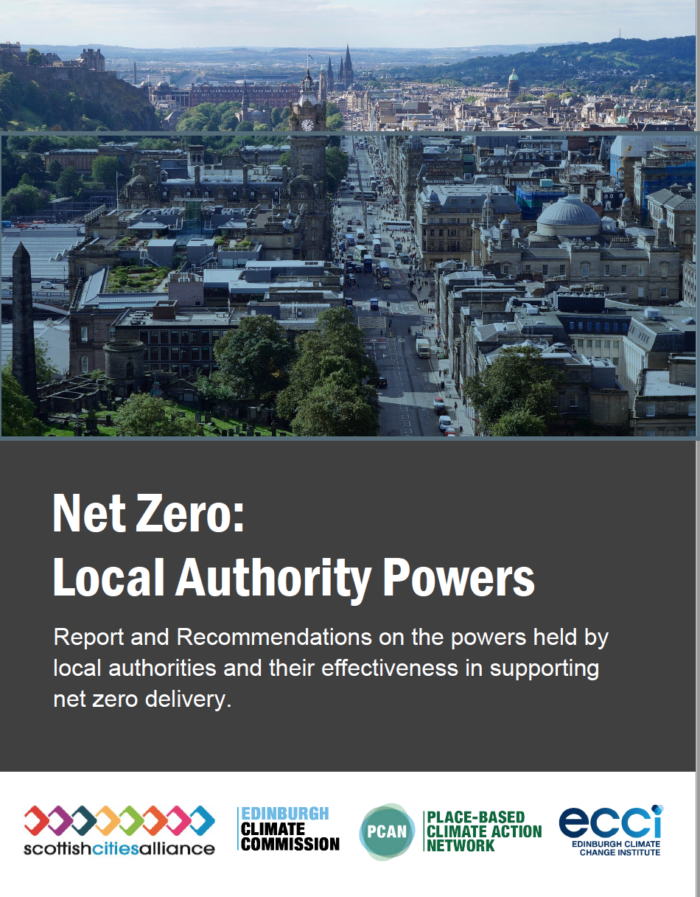
Report and Recommendations on the powers held by local authorities and their effectiveness in supporting net zero delivery
A new report assessing current net zero powers within local authorities has highlighted the vital role local government has to play in hitting Scotland’s climate targets and makes recommendations on where improvements can be made in legislation, policy, finance, coordination and capacity to help accelerate delivery and action.
The Edinburgh Climate Commission worked with ECCI, the Scottish Cities Alliance and the PCAN project to carry out an independent assessment of current net zero powers within local authorities.
The report highlights that with the right powers at their disposal, and the capability and capacity to use them well, local authorities can continue to play a crucial role in leading Scotland’s transition to a thriving net zero economy and becoming a healthier and more sustainable society.
The recommendations are being considered by city local authorities and Scottish Government through the Scottish Cities Alliance, who are facilitating discussion between city leaders and relevant Ministers with a view to finding solutions to the opportunities and challenges raised in the report.
These support some of the recommendations of the Scottish Parliament’s own Net Zero Committee on the role of local government in net zero delivery, which are being debated today (Tuesday 14 March) in the Scottish Parliament. (You can catch up on the debate at Scottish Parliament TV.)
Proposals
Focusing on the relationship between local authorities and the Scottish Government the report sets out a series of recommendations aimed at supporting local authorities to progress net zero. The recommendations comprise a mixture of transformative and incremental actions and are structured to reflect recommendations that relate to:
- Application and development of legislative powers and duties: includes new revenue raising powers (and autonomy in their deployment), a wider application of existing powers and new duties in policy areas critical to net zero.
- Fiscal levers and approaches: includes providing multi-year budgets and support accessing private investment.
- National policy ambition and clarity: includes providing strong, unambiguous policy and ambition at a national level and developing nationwide schemes enabling citizens to decarbonise heat and increase energy efficiency at home.
- Co-ordination and implementation support: includes exploring a net-zero delivery framework between local and national government and greater engagement for cities in the development of national policy.
- Skills, expertise and capacity: support capacity potentially through the development of a proposed ‘Climate Intelligence Service’ with the ability to provide or strengthen knowledge, technical expertise, leadership, procurement and business skills.
Outgoing Chair of the Edinburgh Climate Commission, Dr Sam Gardner, said;
This important report adds to the growing case for greater focus on the vital role local government has to play in hitting Scotland’s climate targets.
There is currently a huge dependency on local action without the necessary supporting package of powers, resources, skills and coordination needed to be sure of releasing the benefits for communities across Scotland. I hope that the recommendations set out in this report, for both national and local government, move quickly into new ways of working that align the strengths of both.
Fourteen years after Scotland passed it first climate act, and faced with the urgency of now, we must address the barriers that still persist today and frustrate our common efforts to tackle the climate emergency.
The report was produced by Dr Dan Barlow, an Associate of the Edinburgh Climate Change Institute. It has been jointly supported by the Edinburgh Climate Commission, the Scottish Cities Alliance and the Place-based Climate Action Network (PCAN), a research project funded by the Economic & Social Research Council (ESRC).
Read the report in full: Net Zero: Local Authority Powers:

